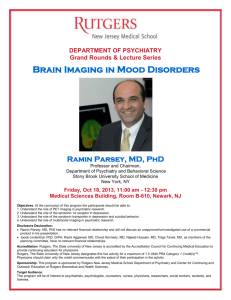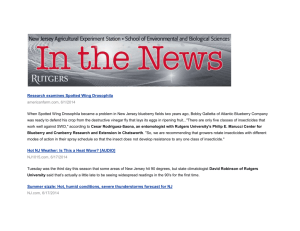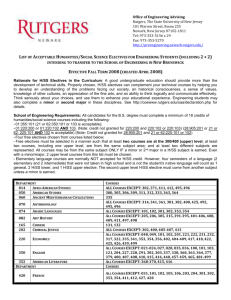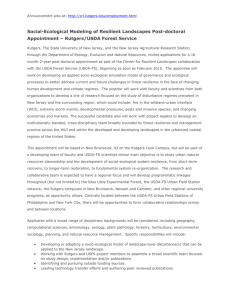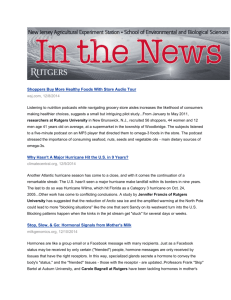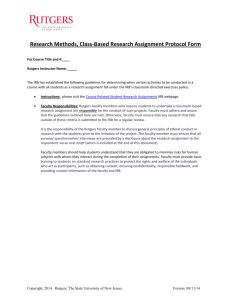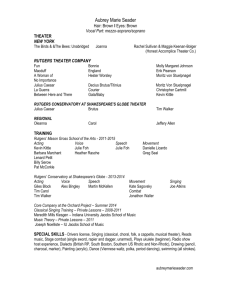April 2015 Film Preview www.indiewire.com, 4/1/2015 Summer
advertisement
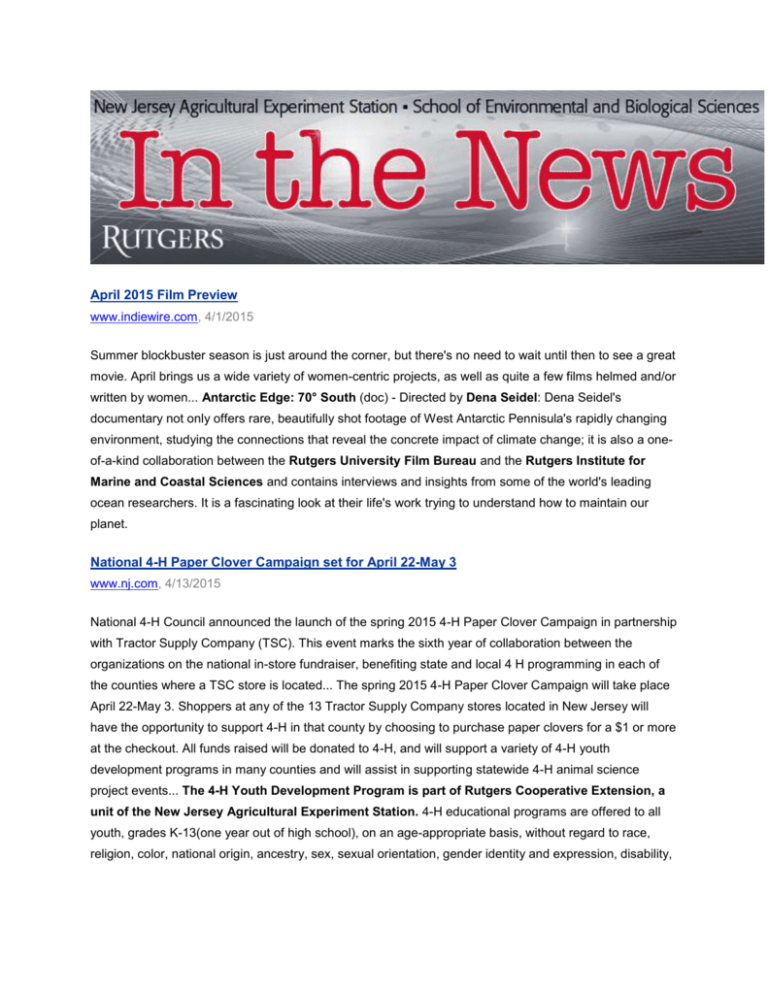
April 2015 Film Preview www.indiewire.com, 4/1/2015 Summer blockbuster season is just around the corner, but there's no need to wait until then to see a great movie. April brings us a wide variety of women-centric projects, as well as quite a few films helmed and/or written by women... Antarctic Edge: 70° South (doc) - Directed by Dena Seidel: Dena Seidel's documentary not only offers rare, beautifully shot footage of West Antarctic Pennisula's rapidly changing environment, studying the connections that reveal the concrete impact of climate change; it is also a oneof-a-kind collaboration between the Rutgers University Film Bureau and the Rutgers Institute for Marine and Coastal Sciences and contains interviews and insights from some of the world's leading ocean researchers. It is a fascinating look at their life's work trying to understand how to maintain our planet. National 4-H Paper Clover Campaign set for April 22-May 3 www.nj.com, 4/13/2015 National 4-H Council announced the launch of the spring 2015 4-H Paper Clover Campaign in partnership with Tractor Supply Company (TSC). This event marks the sixth year of collaboration between the organizations on the national in-store fundraiser, benefiting state and local 4 H programming in each of the counties where a TSC store is located... The spring 2015 4-H Paper Clover Campaign will take place April 22-May 3. Shoppers at any of the 13 Tractor Supply Company stores located in New Jersey will have the opportunity to support 4-H in that county by choosing to purchase paper clovers for a $1 or more at the checkout. All funds raised will be donated to 4-H, and will support a variety of 4-H youth development programs in many counties and will assist in supporting statewide 4-H animal science project events... The 4-H Youth Development Program is part of Rutgers Cooperative Extension, a unit of the New Jersey Agricultural Experiment Station. 4-H educational programs are offered to all youth, grades K-13(one year out of high school), on an age-appropriate basis, without regard to race, religion, color, national origin, ancestry, sex, sexual orientation, gender identity and expression, disability, atypical hereditary cellular or blood trait, marital status, domestic partnership status, military service, veteran status and any other category protected by law. Jurassic Park in Real Life: The Race to Modify the DNA of Endangered Animals and Resurrect Extinct Ones www.independent.co.uk, 4/14/2015 Jurassic Park has a lot to answer for. It made the idea seem so simple. Take the DNA from a microscopic drop of dinosaur blood, preserved for 65 million years in the gut of a mosquito trapped in fossilised amber. Carry out a bit of jiggery-pokery involving chaos theory and Jeff Goldblum. Insert the dino DNA into the yolk of a crocodile's egg and leave to incubate. Soon you'll have a thriving menagerie of onceextinct beasts roaming the jungles of someone's private theme park... De-extinction, or the idea of bringing extinct species back from the dead, has come a long way over the quarter century since Jurassic Park was first published. It has now matured into a quasi-serious science and has even been the subject of its own TEDx conference. Of course, no-one is talking about bringing back dinosaurs- their DNA is lost for good- but some scientists are proposing to resurrect a range of other, more-recently extinct species such as the passenger pigeon and the gastric-brooding frog, both lost within living memory... "If it works, de-extinction will only target a few species and it's very expensive. Will it divert conservation dollars from true conservation measures that already work, which are already short of funds?" asks David Ehrenfeld, professor of biology at Rutgers University in New Brunswick, New Jersey. "At this moment brave conservationists are already risking their lives to protect dwindling groups of African forest elephants from heavily-armed poachers, and here we are talking about bringing back the woolly mammoth. Think about it." Rutgers University's Famed Horse, Lord Nelson Dies at 42 www.nj.com, 4/14/2015 World-renowned equine personality, professor and former mounted patrol horse, Lord Nelson, passed away on April 12 at Gales Way Farm in Wrightstown, N.J. Lord Nelson, who will be remembered as Rutgers University's only equine professor emeritus, lived a distinguished life, full of adventure, up until the ripe age of 42... His personality is one that Karyn Malinowski, director of the Rutgers Equine Science Center and faculty member in the Department of Animal Sciences, says was "one-of-akind." She remembers one night working late in Bartlett Hall on the Cook campus and all of a sudden hearing a fast-paced gallop coming from the road. Upon looking out the window, she saw Lord Nelson, who remembered to "walk" on the sidewalk and not the street, going back to his stable on College Farm Road followed by a police officer, on foot, in hot pursuit. Apparently he wanted to end his shift early that night... Lord Nelson will also be remembered as the first, and only, horse to ever receive an official football penalty in a NCAA football game. In addition to his time with the student mounted patrol, Nelson also served as the horse that was ridden by the Scarlet Knight at Rutgers football games. During a close game against Army in 1994, Nelson broke onto the field and raced all the way down the sideline to the opposite end of Giants Stadium. Receiving a yellow flag for his "un-sportsHORSE-man like conduct," he almost cost Rutgers the game. The Hands Have it: Food Safety Through Handwashing www.barfblog.com, 4/15/2015 Handwashing is simple. Science says otherwise. Despite endless statements to just wash hands to be safe — in the kitchen, in food service, at the petting zoo- little research has been done to quantify what actually works when it comes to hand washing... Dr. Donald Schaffner, a professor of food safety at Rutgers University, and colleagues, have attempted to add some science to the discussion... "Many people seem to have strongly held opinions about handwashing, says Schaffner, "but the research base for those opinions is lacking. Our research begins to dispels some popular beliefs about hand washing."... The researchers showed that even a minimal handwash (5 seconds, no soap) can remove about 90 per cent of bacteria on hands. Scientists Pore Over Warm West, Cold East Divide www.climatecentral.org, 4/15/2015 From blooming flowers to twittering birds, the signs of spring are popping up and the miseries of winter are becoming a distant memory for many. But not for some climate scientists... The curiosity of a growing group of researchers has been piqued by the tenacious temperature divide that has separated East from West over the past two winters as a wild zigzag of the jet stream has brought repeated bouts of Arctic air and snow to the East and kept the drought-plagued West baking under a record-breaking dome of heat... That study, also detailed in Geophysical Research Letters, suggests that while the Pacific heat set the atmospheric pattern in motion, Arctic sea ice loss in a particular region made the warm/cold difference so extreme, said Jennifer Francis of Rutgers University... Francis, who wasn't involved with either study, is one of the main proponents of an idea that by altering how much heat the ocean lets out, sea ice melt and Arctic warming can also change atmospheric circulation patterns, in particular by making the jet stream form larger peaks, or highs, and troughs, or lows. Hence the more intense difference between East and West the last two winters. Rutgers' Lord Nelson, the Horse Once Flagged for a Penalty at Giants Stadium, Dies www.nj.com, 4/15/2015 Sad news from New Brunswick on Tuesday- Lord Nelson, a police horse who worked at Rutgers University and who later was ridden by the Scarlet Knight mascot at football games, passed away at age 42... Lord Nelson is also the answer to one of the more quirky pieces of trivia: He's one of the only horses to be penalized during a college football game... Way back in October of 1994, Rutgers faced Army at Giants Stadium. After scoring a touchdown, Rutgers went up 16-14, but here's what happened before the PAT, according to the New York Times: "Rutgers missed the extra point because of one of its mascots, a horse. Exuberant over what turned out to be the winning touchdown, the rider swept onto the field and rode down the sidelines. That cost the Scarlet Knights 15 yards for unsportsmanlike conduct, and the kicker, Eddie Duborg, had to try his conversion from 35 yards out. He missed." Lord Nelson, a Rutgers Horse, Dies www.nytimes.com, 4/16/2015 Lord Nelson, the only horse to be penalized in a college football game, died. Rutgers University said Lord Nelson was 42. One of his duties during his 37-year Rutgers career was carrying the university's Scarlet Knight mascot during football games. Against Army, in 1994, Lord Nelson was penalized for unsportsmanlike conduct after he broke free and raced down the sideline at Giants Stadium. Review: In 'Antarctic Edge,' a Region of Retreating Ice www.nytimes.com, 4/16/2015 There aren't many uncharted areas left on the globe, but "Antarctic Edge: 70 Degrees South" takes viewers to a spot where surveying is so scarce that the destinations may diverge from their locations on a map. Exploring that terrain could mean getting caught in ice for a month, as one scientist in the film recounts experiencing... The movie, a collaboration between marine science and film divisions at Rutgers University, takes a dry, educational-documentary approach to its material. But if talk of sampling krill and phytoplankton populations conjures memories of biology class, "Antarctic Edge" illustrates its points effectively, providing vivid evidence of how shrinking ice at the South Pole affects climates across the globe. Tired of Bizarre Weather? Blame the North Pacific Mode www.windsorstar.com, 4/17/2015 The past two winters have been marked by a strange trend in weather patterns: the eastern half of the continent has been swamped by insane snowstorms and frigid temperatures, while the west has luxuriated in spring-like temperatures... Jennifer Francis, research professor in the department of marine and coastal sciences at Rutgers University, is not so sure. Her 2012 paper argued the reduction in ice in the Arctic, which is warming at a much faster rate than other latitudes, would intensify pressure ridges, making them more extreme and persistent... "Last winter and this winter we saw this huge ridge parked over the west coast of North America the whole time. This is exactly the kind of situation we hypothesized," she said. De-extinction: Not Just a Movie Plot www.iol.co.xa, 4/17/2015 Carry out a bit of jiggery-pokery involving chaos theory and Jeff Goldblum. Insert the dino DNA into the yolk of a crocodile's egg and leave to incubate. Soon you'll have a thriving menagerie of once-extinct beasts roaming the jungles of someone's private theme park. The 1993 Hollywood blockbuster and Michael Crichton novel of the same name may not have invented the idea of "de-extinction" but they certainly put it out there as a concept... De-extinction, or the idea of bringing extinct species back from the dead, has come a long way over the quarter century since Jurassic Park was first published. It has now matured into a quasi-serious science and has even been the subject of its own TEDx conference... "If it works, de-extinction will only target a few species and it's very expensive. Will it divert conservation dollars from true conservation measures that already work, which are already short of funds?" asks David Ehrenfeld, professor of biology at Rutgers University in New Brunswick, New Jersey. "At this moment brave conservationists are already risking their lives to protect dwindling groups of African forest elephants from heavily-armed poachers, and here we are talking about bringing back the woolly mammoth. Think about it." Solving the Mystery of Rutgers' Penalized Horse: Who Should be Saddled With Guilt? www.nj.com, 4/17/2015 On Wednesday, we brought you the sad news about longtime Rutgers police horse Lord Nelson, who passed away decades after being called for a penalty in a Rutgers-Army game in 1994. But Kevin MacConnell, the former Rutgers associate athletic director for marketing and communications, is "99 percent" sure Lord Nelson wasn't the equine on the field that day. He says it was a horse from Medieval Times, the theme restaurant that includes jousting tournaments in Lyndhurst... Karyn Malinowski, a professor at the School of Environmental and Biological Sciences animal department, sticks by the story that it was Lord Nelson who was penalized that day. She's the same person who purchased the horse for Rutgers in 1978 and who later owned him after he retired in 2000. "It was absolutely Lord Nelson," she said on Friday. "Because I remember seeing the news in The Star-Ledger the next day, that I was very mad at Coach [Doug] Graber's statements because it wasn't Lord Nelson's fault. The rider, somebody asked him to go out on to the field. He didn't just bolt out on to the field." Environmentalists Re-Establishing Barnegat Bay Oyster Colony www.abcnews.com, 4/19/2015 A century ago, oysters were so plentiful in New Jersey's Barnegat Bay that visitors would clamber off trains, wade into the water and pluck handfuls to roast for dinner. But decades of pollution, accelerated by rampant development along the bay's shores, have reduced the oyster population to a small fraction of what it once was... The Berkeley Township project is but one of many such efforts underway in waterways around New Jersey. A group led by Rutgers University researchers successfully raised oyster seedlings in cages suspended from the sides of the Earle Naval Weapons Station in Middletown in the waters of the even more-polluted Raritan Bay, and is looking for ways to expand the project. The Littoral Society is doing a similar project, primarily aimed at storm protection, in Delaware Bay. West Milford 4-H Starts its 'Critters Against Litter' Campaign www.northjersey.com, 4/19/2015 While it's typical for animals to be coming out of hibernation at this time of the year, certain critters may be catching the eyes of passersby in West Milford this week. A wander around the township will reveal eight critters that have been distributed, each with a sign hand-painted on both sides, asking the public to "Stop Litter!" and "Keep West Milford Beautiful," as well as other Earth Day-related slogans aimed to raise awareness of the impact of litter... The eight critters were selected by 4-H Velveteens to represent both local wildlife and local farm animals with which the club members have actually worked. One is a bear that reminds residents: "Your trash attracts me!" The other painted animals include a chicken, a rabbit, a goat, a pig, a fox, a baby goose, and a fawn... 4-H, which is part of the land grant university system, is the youth division of Rutgers University in NJ, Cornell in N.Y., and Penn State in Pa. and exists in every county in America and in many countries around the world. It employs informal educational programs and promotes "learn-by-doing" to enable youth to develop the knowledge, attitudes and skills they need to become competent, caring and contributing citizens of the world. CSI UV Goggles? How to Tell If An Egg is Bad www.barfblog.com, 4/20/2015 Friend of the barfblog and current Welsh tourist, Don Schaffner of Rutgers University, has a few things to say about egg safety, especially: most of those so-called tests are BS... The theory behind the float test? Egg shells are porous, and as time goes on the egg's liquid evaporates through the porous shell and air enters. That makes the eggs more buoyant, so some say the older an egg, the more it floats... Forget this test, says Don Schaffner, PhD, a food scientist at Rutgers the State University of New Jersey. "Eggs do take in air as they age, but the size of the air cell in the egg varies from egg to egg. So a freshly laid egg and an older egg may react similarly." There is too much variability in air cell size from egg to egg to make this a valid test, he says... "Salmonella is the organism we are most worried about," Schaffner says. It could be inside the egg if it was infected before it was laid, or it could be on the shell. We invite you to send an email to InTheNews@aesop.rutgers.edu alerting us when you are quoted in a story or if your program is mentioned in the news. Please send links of news, as it happens, as some media outlets do not retain online links beyond a week. Visit the SEBS and NJAES Newsroom at sebsnjaesnews.rutgers.edu.
